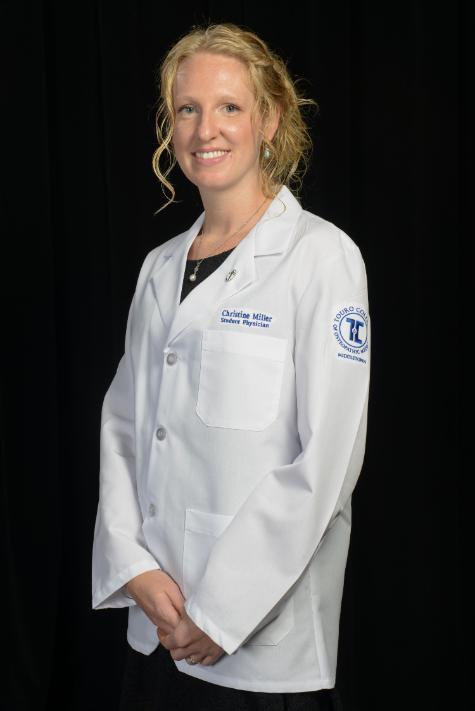Christine Miller Named TouroCOM-Middletown’s Student D.O. of the Year
This jack-of-all-trades is also a master of many: Learn more about the Boston native.

She’s run six marathons and varsity cross-country. She’s an athlete, an author, a coder, a chemist, a teacher, a backpacker, a researcher, and a painter. She leads the Student Ambassador Program with fellow medical student Daniel Lee. And now, she’s TouroCOM-Middletown’s Student D.O. of the Year.
“Christine Miller has demonstrated excellent academic work, community participation, and leadership skills in the medical school among her student colleagues and professors,” said Dean Kenneth Steier, dean of TouroCOM-Middletown. “Her personality, collaborative spirit, and constant willingness to be of assistance to her fellow students makes her an excellent role model and student ambassador. I am confident she will emerge in four years as an outstanding osteopathic physician.”
We spoke to the Boston native about her background, research, hobbies, and experience at TouroCOM-Middletown thus far. Here’s what she had to say:
On her research experience
After graduating from Bucknell University, Christine returned to Boston, her hometown, to study stem cell biology full-time. She worked as a research assistant, and then lab manager, for Harvard’s Stem Cell and Regenerative Biology department, studying how stem cells influence muscle regeneration, aging and oncogenesis. One major accomplishment that resulted out of her team’s research efforts was discovering certain powerful implications of a factor called GDF11 on the regeneration of cardiac muscle. “It was amazing,” says Christine, “because this had huge implications. It’s common knowledge that cardiac hypertrophy is increased in aged hearts, but as we saw in our experiments, GDF11 changed all that. In joining young mice to old mice in a procedure called parabiosis, we found that GDF11 reduced cardiac hypertrophy in the hearts of aged mice, as well as increased vascularization and olfactory connections in their brains.” Christine’s discoveries with GDF11 in the 1000 pairs of parabiotic mice she studied resulted in seven influential publications in prestigious journals, including Science and Cell, as well as a presentation at the NextGen Stem Cell conference in Saratoga Springs in May 2014.
On starting (and managing) an iPS core facility
In 2013, Christine became one of the founders—and core manager—of the newly formed induced pluripotent stem cell (iPS) core facility at Joslin Diabetes Center, which focused on reprogramming cell lines using cutting-edge techniques and working with researchers and local core facilities to develop new approaches for iPS cell reprogramming. As one of the founders, Christine was responsible for setting up cell-culturing workshops, developing best-practice techniques, and training post-docs on using the innovative new technology she and her team developed—technology that is now being used by several research institutions, including Northeastern University and The Boston Children’s Hospital. “I was the sole scientist working in the core facility so I personally performed all of the research and work, and represented the iPS core in the greater stem cell community. I feel so proud to have contributed so much to the medical community, and to have been a part of getting something started. It was all very exciting!” says Christine.
On how she got to medical school, and TouroCOM-Middletown
“I originally planned on becoming a full-time researcher, but after working at Joslin for a bit, I was really inspired by a few physician scientists in the lab,” says Christine. “I loved how their purpose in the lab was so singular: to better help their patients. This helped me realize that I wanted a ‘face’ to my work, too.” Now, the medical student hopes to someday “be able to couple my medical education with bench-top research for my patients as well.” Already a big fan of the Khan Academy, Miller was attracted to TouroCOM’s flipped-classroom concept (in which medical students listen to professors’ iTunes lectures independently during their own time, and then get quizzed on the material during class.) “I thought it would help me stay on top of the material better and give me more control over my schedule,” says the medical student. “And it’s great practice for the real world. When a doctor asks you your opinion, you need to be able to answer on the spot. So constantly being probed during class helps reinforce concepts and prepares us better for boards and clinical rotations."
On her interest in coding
The first-year medical student began learning to code last year when she joined a Boston meet-up group for female programmers. The “Pythonistas,” as it was called, focused on teaching women to code in the programming language Python. “I realized what a powerful tool a computer can be if you only know how to use it. As someone with no technological intuition whatsoever, I thought that learning to code would be a great way to face my computer shortcomings.” “And once a week, outside of the meet-up, a one of the other women and I went across the street to the bar to work on some problems together. We called it ‘Pints and Python'!”
On how she manages her time
“We all have a cognitive surplus, as Clay Shirky once discussed in a TED Talk I love. If we really want to do something, many of us can allocate our time differently. I try to be cognizant of what I'm choosing to spend my time on, and I also don't mind jumping into something new to try it out.” The avid runner, who has run six marathons so far, was recruited to her undergraduate college to run track. She also enjoys painting landscapes in her spare time. ("As a medical student and researcher, it's a nice change of pace!") “I'm definitely a glass-half-full kind of person, so I think that no matter the outcome, in the end I'll have learned something.”

